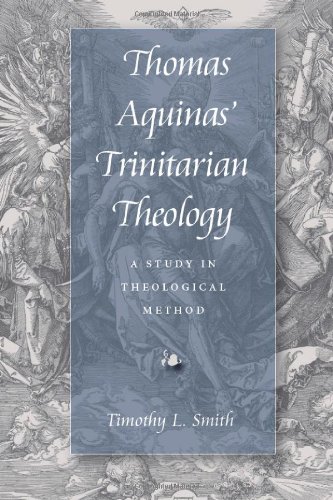Thomas Aquinas' work on the Trinity in his Summa Theologiae has for the past century been seen, along with Augustine's De Trinitate, as representative...
Read more
of a Latin Trinitarian tradition. This tradition is assumed to begin with the one God, the one divine essence as a whole. Only afterwards does it see God as three in Persons. Philosophical concerns--rather than the revelation of God in Christ--are assumed to be the basis for the discussion. According to many modern theologians the immanent life of God in this tradition is thereby separated from the rest of Christian faith and, consequently, has no relevance for the believer. This book examines Thomas' Trinitarian theology in light of this criticism. Thomas' account of the Trinity of Persons and the coherence of language about those Persons is not a rational demonstration but an expression of faith seeking understanding. The crucial foundation for this doctrine is Thomas' theory of divine naming. The later chapters examine possible influences upon Thomas including the work of earlier theologians, the speculative grammarians contemporary with him and his own teacher, Albert. Timothy Smith concludes that although Thomas is best understood when read in light of his own intellectual context, one cannot assume that every influence is positive. Thomas' presentation of Trinitarian doctrine in his Summa Theologiae is an essential text for anyone interested in the great Dominican's theology. One finds here the meeting of a host of philosophical and theological issues. And in the prism of this particular text, the reader will gain a better understanding of the complexity and beauty of scholastic theological method.Timothy L. Smith is a tutor at Thomas Aquinas College in Santa Paula, California, and a former post-doctoral fellow and instructor at The University of Notre Dame. Smith is the author of a series of articles on Aquinas' theological method and sources and is the editor of Faith and Reason and Aquinas' Sources, both published by St. Augustine's Press.PRAISE FOR THE BOOK:"[A] model work in historical theology and philosophy, simultaneously showing a deep understanding of Thomas's medieval context and a sensitivity to contemporary theological issues.... This enjoyable and enlightening book is written with a clarity most admirable in a study of very difficult parts of Thomas's thought that are central to our understanding of both his theology and his philosophy. It should be read by anyone interested in Aquinas or Trinitarian doctrine, whether within a medieval or a contemporary context." -- Alexander R. Pruss, Speculum"It contains a great amount of information. It does make some important points on Aquinas' method." Lucien J. Richard, OMI, Catholic Library World"Timothy Smith's study is very useful for definitively dismissing certain criticisms leveled against St. Thomas's theology, in particular the charge that sees in Aquinas a rationalist attempt to demonstrate the Trinity. The attention paid to methodology and analogy in also key: Smith is to be commended for clearly calling this to mind."--Gilles Emery, The Thomist"Smith's careful investigation of Thomas's method, sources, and use of theological language guides the reader into a fresh appreciation of the nuances of Aquinas's work, free of imposed and distorting presuppositions. As such, it is a valuable contribution both to historical investigation of Thomas Aquinas, and to contemporary discussions of the doctrine of God and theological disclosure."--Wanda Zemler-Cizewski, Anglican Theological Review"A good overview of Aquinas' epistemology in the light of the Trinity."-Hans Geybels, Louvain Studies
Hide more




